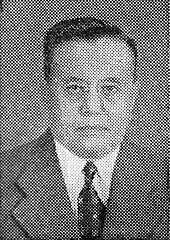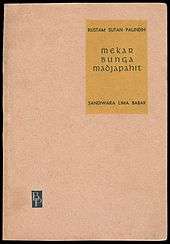Roestam Sutan Palindih
- The names Sutan and Palindih are honorifics. The subject should be referred to by his given name, Roestam.


Roestam Sutan Palindih (Perfected Spelling: Rustam Sutan Palindih) was an Indonesian film director and writer. He was born in Fort de Kock, Dutch East Indies (now Bukittinggi, Indonesia) in 1898.[1] He finished his education in various cities, including Batavia (now Jakarta), Bandung, Padang, and Medan.[2] In the 1920s and 30s Rustam held a variety of jobs, including as the owner of a small shop and a farmer. He eventually became involved with the journalistic and literary industries, working at Balai Pustaka and heading the newspaper Harian Neratja.[2] From 1933 until 1938 he was a member of a native political council, vocally opposing the Dutch colonial presence in the Indies.[3]
Rustam began his involvement with the local film industry during the 1940s, writing novelisations of films by Tan Tjoei Hock and Soeska.[2][4] After the Empire of Japan occupied the Indies beginning in 1942, he collaborated with the Japanese forces in making the short propaganda films Di Desa and Di Menara for the studio Nippon Eigasha.[5][6] During the Indonesian National Revolution (1945–1949) that followed the occupation Rustam directed his only feature film, Air Mata Mengalir di Tjitarum (Tears Flow in Tjitarum), in 1948, which was the feature film debut of Sofia WD.[5][7] His last work in the film industry, a script entitled Terang Bulan (Full Moon), was filmed in 1950 and directed by Mustadjab. Starring Sofia and Rd Mochtar, the production followed two lovers separated by crime, war, and family who are ultimately able to reunite.[7]
By the 1950s, after Indonesia's independence was recognised, Rustam had become mostly a literary documentarian, although he continued to publish some works on the subject.[2] He also wrote on the nation's politics and recorded a version of the folktale Lutung Kasarung.[4] He died in 1971 after several years of ill health.[1]
Filmography
Palindih directed two short propaganda films and one feature film. He wrote a total of four films:[8][5]
- Di Desa (In the Village; 1943; short film) – Director and screenwriter
- Di Menara (In the Tower; 1943; short film) – Director and screenwriter
- Air Mata Mengalir di Tjitarum (Tears Flow in Tjitarum; 1948) – Director and screenwriter
- Terang Bulan (Full Moon; 1950) – Story
References
Footnotes
Bibliography
- Abdullah, Taufik (2009). Indonesia: Towards Democracy. Singapore: Institute of Southeast Asian Studies. ISBN 978-981-230-366-0.
- "Air Mata Mengalir di Tjitarum". filmindonesia.or.id (in Indonesian). Jakarta: Konfidan Foundation. Archived from the original on 23 August 2012. Retrieved 23 August 2012.
- Biran, Misbach Yusa (2009). Sejarah Film 1900–1950: Bikin Film di Jawa [History of Film 1900–1950: Making Films in Java] (in Indonesian). Jakarta: Komunitas Bamboo working with the Jakarta Art Council. ISBN 978-979-3731-58-2.
- Eneste, Pamusuk (2001). Buku Pintar Sastra Indonesia [Handbook of Indonesian Literature] (in Indonesian) (3rd ed.). Jakarta: Kompas. ISBN 9789799251787.
- "Roestam St Palindih | Filmografi" [Roestam St Palindih | Filmography]. filmindonesia.or.id (in Indonesian). Jakarta: Konfidan Foundation. Archived from the original on 23 September 2012. Retrieved 23 September 2012.
- "Rustam Sutan Palindih" [Rustam Sutan Palindih | Filmography]. filmindonesia.or.id (in Indonesian). Jakarta: Konfidan Foundation. Archived from the original on 3 October 2012. Retrieved 3 October 2012.
- "Rustam Sutan Palindih". WorldCat (in Indonesian). Archived from the original on 3 October 2012. Retrieved 3 October 2012.
- "Rustam Sutan Palindih | Filmografi" [Rustam Sutan Palindih | Filmography]. filmindonesia.or.id (in Indonesian). Jakarta: Konfidan Foundation. Archived from the original on 3 October 2012. Retrieved 3 October 2012.